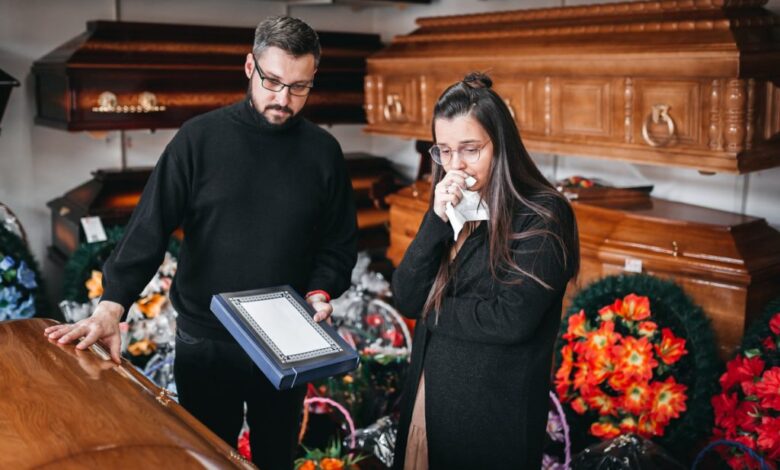
How to Become a Mortician and Other Jobs in the Funeral Industry
[ad_1]

There are a lot of reasons for thinking about becoming a funeral director, the funeral industry’s preferred term for mortician.
For one, the unemployment rate is low. For another, there’s always a need.
And, it is one of the careers that does not require a bachelor’s degree that still pays well. Funeral directors make an average of $55,000 a year. That’s the average and some directors with more experience bring in more than $70,000. As far as school, most states require an associate’s degree, an apprenticeship/internship, and passing a licensing exam.
If working with bereaved families and preparing bodies for burial or cremation seem like something you would be good at, consider this well-paying career path. The funeral industry is estimated to be worth $16 billion in the United States in 2021.
Read on to find out how to become a mortician.
Contents
The Difference Between a Mortician and Funeral Director
First, let’s clarify some terms. What are the differences between mortician, funeral director, embalmer and undertaker? They have similar roles but slightly different duties.
In 1895, an American publication called The Embalmer’s Monthly put out a call for a new term for undertakers. The winner was mortician, a made-up word and thank goodness for Morticia Addams, right? Now, the industry uses funeral director for the person arranging the funeral service.
Most funeral directors are licensed morticians and embalmers. They have studied mortuary science and prepare bodies, but they also arrange the other aspects of funeral services. Funeral directors help the bereaved plan the memorial service (and might conduct it if there is no clergy) and arrange for cremation and burial. Funeral directors deal directly with the clients.
An embalmer can work for a funeral home, but also elsewhere — medical schools, hospitals, and morgues. They mainly prepare bodies, and don’t work with clients. The term undertaker is the British term for funeral director and is seldom used in the U.S. except when referring to the popular professional wrestler, The Undertaker.
What Does a Funeral Director Do?
Funeral directors deal with both the living and the dead. Funeral directors arrange for moving the body to the funeral home. They file the paperwork for death certificates, obituaries, and other legal matters.
Preparing a body for the funeral service may or may not include embalming (cremation doesn’t require embalming), but it needs to be dressed, cosseted (put in the best and most natural appearance), and casketed (placed in the coffin).
Funeral services are difficult times for people. The funeral director needs to have compassion for people navigating their pain and sorrow. While an interest in science is necessary, an important quality for someone who wants to become a mortician or funeral director is empathy.
The funeral director guides the grieving through the decisions that have to be made for the funeral service. This not only includes choosing the coffin, but placing the obituary, arranging the wake and service and creating a program for it, shipping remains, and more.
The Changing Funeral Business
Most funeral homes are independently owned. While often smaller businesses don’t have the deeper pockets of corporations, their size allows them to be more nimble in evolving their business. Funeral services have transformed from somber and sorrowful times to celebrations of life with some funeral homes even providing spaces for outdoor gathering complete with grills.
In recent years, more women are graduating in mortuary science. Some people might become funeral service workers as a second career instead of inheriting the business, which has been a traditional entry into the industry. The National Funeral Directors Association encourages its members to seek out, hire, and train more women and non-binary people.
You can find mortuary science stars on social media, including the popular YouTube channel, Ask a Mortician. There are funeral directors’ TikTok videos, and mortician AMAs (ask me anything) on Reddit.
Get Started in the Funeral Business
Most states require a two-year associate’s degree in mortuary science or related areas, an apprenticeship or internship, and passing the national or state’s license exam. Ohio and Minnesota are the only two states that require a bachelor’s degree to be a funeral home director. Colorado does not have any education requirements, but licenses funeral homes instead. Kentucky doesn’t license funeral directors but does license embalmers.
If you were also thinking about joining the military, the Navy is the only service branch with its own morticians. For that you need a high school diploma or GED, and then you would get training through the Navy as a hospital corpsman-mortician.
Licensure
You usually have to be at least 21 years old to take the exams, though you can start an internship or apprenticeship before that age. There may also be a criminal background check. Having a criminal record doesn’t mean you can’t become a mortician. You also have to submit proof of U.S. citizenship or permanent residency.
You can also study for and take the national funeral service education board exam. The pathways to these two types of exams can be different. It is important to note that not all mortuary science programs are accredited by the American Board of Funeral Service Education (ABFSE).
You can only take the National Board Exam if you have a degree from an accredited program. Some states allow you to take the state exam even if your program is not accredited. The exams are the same. It is just more difficult to practice in a different state if you haven’t attended an accredited program.
State Licenses
Most states have information about how to become a mortician through their occupational license, public health, or funeral board sections on their website. It is important that you clarify whether the mortuary science programs are accredited for just the state license exam, or for both state and national exams. Some schools also offer Funeral Arts Certificates, which can be used for other jobs in the funeral service industry.
National License
The American Board of Funeral Service Education is the national academic accreditation agency for college and university programs in Funeral Service and Mortuary Science Education. Most states have easier reciprocity requirements to transfer your practice if you have taken the national board exam. If you have taken the state exam only, you may have to meet all of the requirements again if you move to another state.
Classwork for the License
Coursework can be broken down into roughly three categories: art, business, and science. Art? That is for the restorative arts, or visually preparing the body for a funeral service, which includes hair and makeup. There are courses which cover death traditions from many cultures and the history of funerals.
Science classes may cover embalming theory and labs, anatomy, physiology, public health, and pathology. There are chemistry and biology courses, and also usually psychology courses on grief and bereavement training.
Business classes will cover funeral home administration, accounting, requirements for a funeral service license, and some business law. There are usually classes covering legal and ethical issues that a certified funeral service practitioner will face.
Cost of Getting a License
The cost of getting a two-year mortuary science degree varies by state but your best bet will be an in-state community college. Then there will be costs associated with taking exams and getting a license.
School
There is a huge difference in how much you can pay for a mortuary science associate’s degree. In-state public schools may cost between $5,000-$8,500. Private, out of state tuition might be almost $20,000. There are the normal student loans and grants available, but there are also specific grants for students studying mortuary science (even as a second career). It seems like a great investment, since unemployment for funeral directors is extremely low.
Exam
The National Board Exam has two sections, arts and sciences. Each one costs $285. There are practice exams that you can take, which are free. In Florida, the state funeral service examining boards charge $132 for exams. Maine charges $75 plus $21 for a criminal background check. Texas charges $89. Some states have two separate exams — one for funeral services and the other for embalming.
Licenses
This is another area with variation. Using the same three states as above, Florida’s license for a funeral director costs $430 with all the fees. Maine’s is $230, and Texas costs $175 plus $93 for the application. Apparently not everything is bigger in Texas! Licenses need to be renewed periodically, which also requires continuing education credits.
Funeral Director as Entrepreneur
The funeral industry has been changing rapidly over the last few years. Cremations have increased and burials decreased. Funeral homes make less money on cremations, and have responded to this shift by finding new sources of income and new ways to help people.
Green Funerals
There are more environmentally conscious choices that funeral homes can offer, including rental coffins for services (and a plain one after), biodegradable coffins, and natural burials. Green funeral services include sourcing flowers locally, using funeral invitations and programs made of recycled paper embedded with seeds, and biodegradable water urns, which sink and dissipate for at sea services..
Pet Funerals
An estimated 67% of households in the U.S. own pets, and many of them are using funeral home services for their animals. That includes memorials, services, and burials. Despite pet cremation being infinitely (well, 90 vs.10%) more popular than burial, there are over 200 pet cemeteries in the U.S., with Florida having the most.
Other Jobs in the Funeral Industry
Besides being an intern or apprentice, you can work in the funeral industry in many other ways. Florida lists 16 separate individual and business licenses for funeral home-related activities.
Here are the common jobs in the funeral or mortician industry though keep in mind in a smaller business, the funeral director may do some of them:
- Administrative assistants handle office work.
- Burial rights brokers arrange for third parties to sell or transfer burial rights.
- Cemeterians maintain cemetery grounds (think groundskeeper).
- Ceremonialists conduct the funeral service.
- Crematory operators/technicians assist in cremation remains.
- Direct disposers handle cremation when there is no service or embalming.
- Embalmers prepare the body after death.
- Funeral arrangers work with clients to set up the funeral.
- Funeral home manager is the best paying job in the field, the median salary for this position is more than $74,000. The manager oversees all funeral home operations.
- Funeral service managers are similar to funeral arrangers.
- Funeral supply sales personnel work for the funeral home-sourcing supplies.
- Monument agents sell tombstones and other markers for the cemetery.
- Mortuary transport drivers prepare and transport human remains.
- Pathology technicians work in hospitals, morgues, or universities with cadavers.
- Pre-need sales agents help clients plan their services and burials before they die.
Frequently Asked Questions (FAQs) About Funeral Business Jobs
We’ve rounded up the answers to the most common questions about working in the funeral industry.
What Jobs Can You Do at a Funeral Home?
negotiate supplies, transport bodies, conduct funeral services, and work with clients to place obituaries and arrange the service. They also have sales people working on pre-need arrangements. Some funeral homes feature pet burials and have special jobs related to that.
How Much Do You Make Working at a Funeral Home?
Funeral directors average $55,000 annually. Managing a funeral home pays a median salary of $74,000. Mortuary transport drivers average over $35,000. It is a field with very low unemployment.
How Do I Get a Job in the Funeral Industry?
Most states require two years of school, a (paid) internship, and passing the appropriate license exams to become a funeral director. Other jobs may require less.The mortuary transport driver has to be able to lift 100 pounds or more and have a clean driving record.
What is a Funeral Home Job Called?
There are many. There are funeral directors, embalmers, mortuary transport drivers, and funeral service arrangers. There are also typical office jobs, such as administrative assistant and bookkeepers. There are also related jobs at crematoriums, hospitals, and mortuaries.
The Penny Hoarder contributor JoEllen Schilke writes on lifestyle and culture topics. She is the former owner of a coffee shop in St.Petersburg, Florida, and has hosted an arts show on WMNF community radio for nearly 30 years.
[ad_2]





